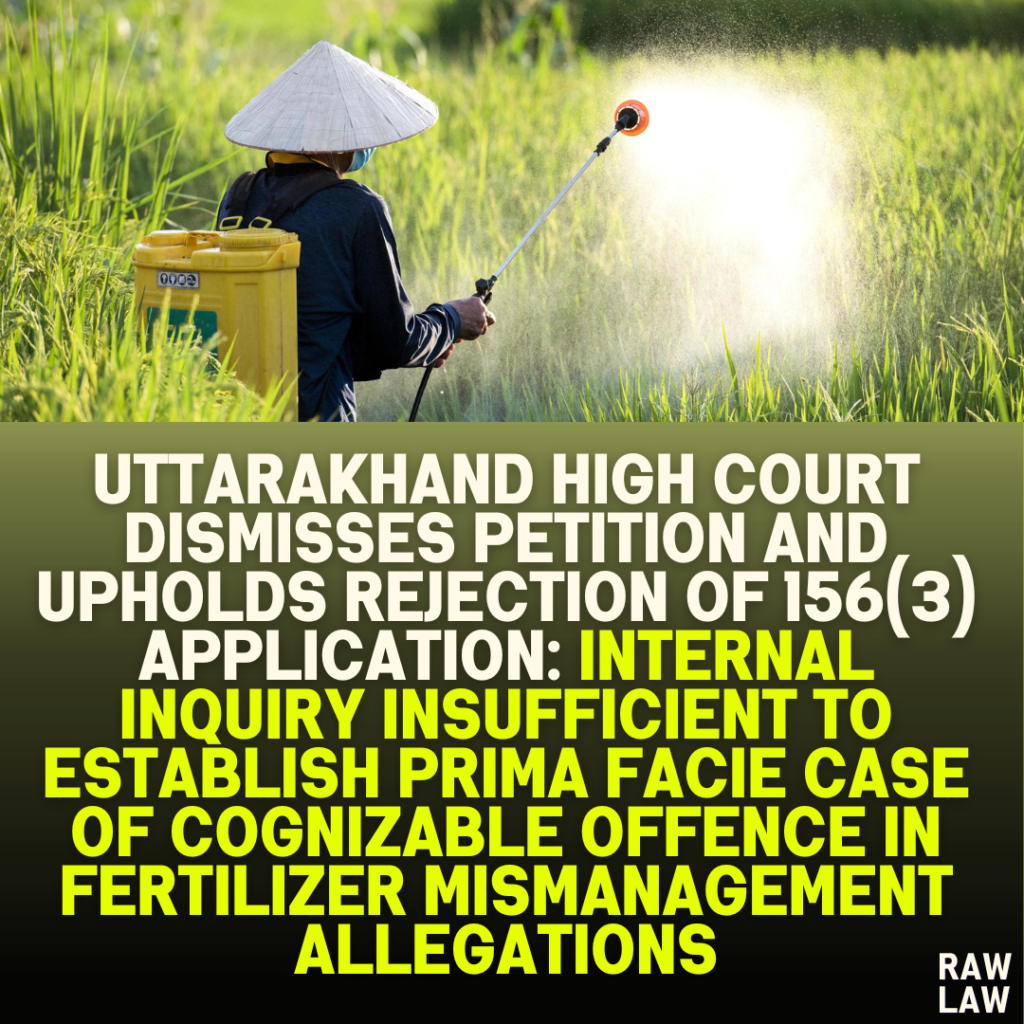Court’s Decision:
The Uttarakhand High Court dismissed the petition at the admission stage, upholding both the orders of the Additional Chief Judicial Magistrate and the Sessions Court. The court concluded that no cognizable offence was prima facie established and found no error in the findings of the lower courts.
Facts:
The petitioner filed an application under Section 156(3) of the Code of Criminal Procedure, alleging that the respondents purchased fertilizers from Cooperative Sugar Committee, Laksar, and sold them at higher prices, resulting in inflated costs for farmers and the petitioner. Furthermore, the petitioner claimed that the respondents had taken loans beyond the prescribed limits between 2015 and 2017.
Issues:
The primary issue was whether the allegations made in the petitioner’s 156(3) application disclosed any cognizable offence that would warrant a police investigation.
Petitioner’s Arguments:
The petitioner argued that the respondents’ actions of selling fertilizers at inflated prices and exceeding loan limits constituted a cognizable offence and necessitated a police investigation. The petitioner urged the court to interfere with the orders of the lower courts, which rejected his application.
Respondent’s Arguments:
The respondents did not directly present their arguments in the proceedings outlined in the judgment. However, the courts relied on the police report, which indicated that an internal inquiry into the matter was pending within the Sugar Committee, and no FIR had been lodged.
Analysis of the Law:
The court focused on the application of Section 156(3) of the Code of Criminal Procedure, which allows magistrates to order an investigation by the police if the facts of the case disclose a cognizable offence. The lower courts had determined that the petitioner’s allegations did not meet this threshold.
Precedent Analysis:
No specific precedents were cited in the judgment. However, the court’s reasoning aligns with the principle that magistrates should not order investigations under Section 156(3) if no prima facie offence is disclosed.
Court’s Reasoning:
The court emphasized that both the Additional Chief Judicial Magistrate and the Sessions Court had carefully considered the petitioner’s allegations and found no evidence of a cognizable offence. The court reiterated that a mere internal inquiry was underway, and this alone did not substantiate the petitioner’s claims. The court found no merit in interfering with the lower courts’ orders.
Conclusion:
The High Court dismissed the petition, affirming that no cognizable offence was disclosed and that the findings of the lower courts were correct. The petition was dismissed at the admission stage.
Implications:
This decision underscores the court’s reluctance to interfere in matters where the allegations do not meet the threshold for a cognizable offence. It reinforces the principle that Section 156(3) applications must be backed by substantive prima facie evidence to warrant police investigations.




Pingback: Kerala High Court Upholds Appellate Court's Power to Grant Interim Orders in Domestic Violence (DV) Act Appeals Under Section 29, Modifies Maintenance to ₹25,000 Pending Appeal Even When Not Expressly Provided - Raw Law
Pingback: Supreme Court Sets Aside Lower Court Findings, Holds Car Driver Negligent in Fatal Accident: Awards ₹46 Lakhs Compensation to Victim’s Family, Emphasizes Preponderance of Evidence Over Strict Proof - Raw Law